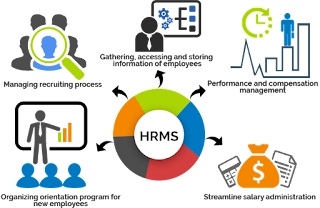Why Every Organisation Must Invest in Customised HRMS Software
Introduction
HRMS software is crucial
for streamlining procedures, managing data, and improving workforce operations
in the field of human resource management. But every organisation operates in a
different manner and with different set of rules, therefore it is necessary to
customise the software according to the organisations’ requirements. Organisations' awareness of the variety of
their HR requirements has led to a sharp increase in demand for custom software
that can accommodate these particular needs. In this blog post, we explore the
idea of customisation and flexibility within HRMS software,
looking at how moulding the programme to a company's particular requirements
can increase productivity, boost user experience, and ultimately produce better
business results.
Recognising
the HRMS Software's Power of Customisation
The secret to unleashing
the full power of HRMS software is
customisation. It enables businesses to match the software to their current
procedures, guidelines, and preferences. Imagine having an HRMS solution that
effortlessly integrates into your workflow, improving the capability of your HR
team rather than controlling it. Customisation gives businesses the ability to
integrate the software into their daily operations, encouraging user
involvement and a sense of ownership.
Important
Customization Areas for HRMS Software
The flexibility of
customisation encompasses a number of features of HRMS software. The following
aspects, from user interfaces to reporting modules, can be customised to a
specific organisation's requirements:
User Interfaces: Make the design, colours, and menu
choices your own to give your HR team a simple-to-use interface.
Data Fields: Ensure that crucial data is accurately
tracked by modifying data entry fields to gather information particular to your
organisation's requirements.
Workflows: From employee onboarding to performance
evaluations, align HRMS workflows with your organisation's operations.
Reporting Modules: Design customised reports that offer
real-time insights into the parameters that are most important to your business
using reporting modules.
Integration Capabilities: Integrate the HRMS and payroll
software with other corporate technologies to guarantee smooth data
transfer between platforms.
Benefits of HRMS Software Customization
Enhanced Productivity and Efficiency: Customised workflows eliminate
superfluous and repetitive jobs and reorganise workflows to speed up task
completion.
Improved Data Accuracy: Customised data fields make sure you
accurately record the information that is most important to your organisation.
Improved User Adoption: User-friendly interfaces make it simpler
for staff members and HR specialists to use the programme.
Data-Driven Decision-Making: Personalised reporting modules offer
useful information that enables smart and knowledgeable HR decisions.
Customization
and Best Practises in Balance
Although customization is a
potent tool, it's important to balance modifying the software with upholding
recommended practices. Over-customization can make software unstable, prevent
updates in the future, and make integration difficult. Organisations must
carefully consider whether a customization is required or whether a change to
current procedures can produce the desired results. Finding this balance guarantees
that your software will continue to be reliable, effective, and compliant with
industry requirements.
Guidelines
for Successful Customization
Before you go overboard
with the customisation process, here are a few basic guidelines that can help
you create a great custom HRMS system:
- To determine the areas where customization is actually
required, conduct a thorough needs analysis.
- Create a detailed customisation roadmap outlining the
modifications you intend to make.
- To make sure the programme satisfies their needs,
prioritise user feedback and involve stakeholders from multiple
departments.
Conclusion
The pillars that raise HR
management from transactional activities to strategic decision-making are
customisation and flexibility inside HRMS software. Organisations have the
capacity to make better decisions, work more efficiently, and have better data
accuracy as they realise the importance of matching software to their specific
needs. By customising the software to your organisation like a glove, you're
making an investment in a time when HR management will successfully support the
expansion and success of your company.
If you need a customised
HRMS software for your organisation, you can check out Opportune HR. They provide one of the best HRMS software in India
that specialise in creating HR softwares for startups and mid-sized companies.
Visit their website to learn more about their services.




Comments
Post a Comment